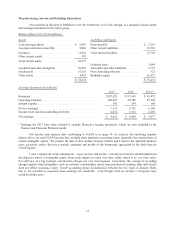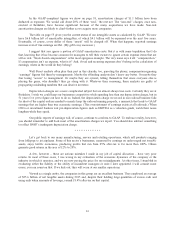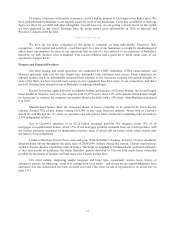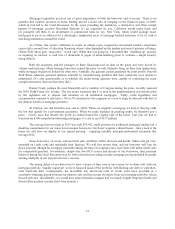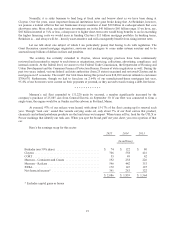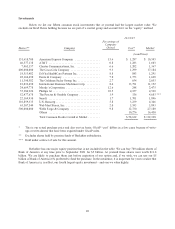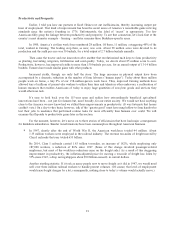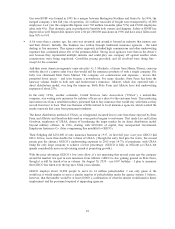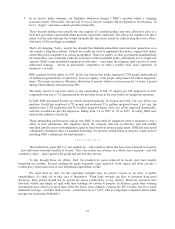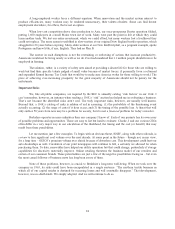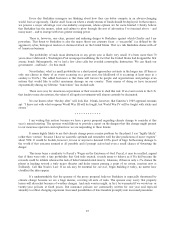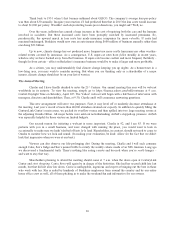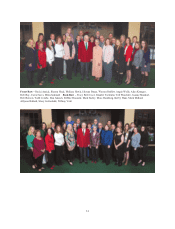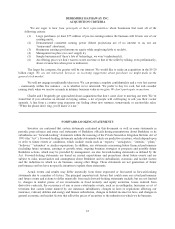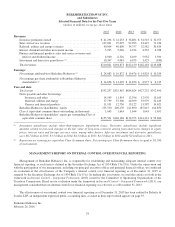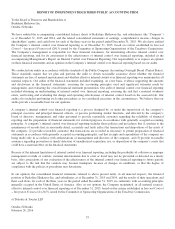Berkshire Hathaway 2015 Annual Report Download - page 27
Download and view the complete annual report
Please find page 27 of the 2015 Berkshire Hathaway annual report below. You can navigate through the pages in the report by either clicking on the pages listed below, or by using the keyword search tool below to find specific information within the annual report.Every day Berkshire managers are thinking about how they can better compete in an always-changing
world. Just as vigorously, Charlie and I focus on where a steady stream of funds should be deployed. In that respect,
we possess a major advantage over one-industry companies, whose options are far more limited. I firmly believe
that Berkshire has the money, talent and culture to plow through the sort of adversities I’ve itemized above – and
many more – and to emerge with ever-greater earning power.
There is, however, one clear, present and enduring danger to Berkshire against which Charlie and I are
powerless. That threat to Berkshire is also the major threat our citizenry faces: a “successful” (as defined by the
aggressor) cyber, biological, nuclear or chemical attack on the United States. That is a risk Berkshire shares with all
of American business.
The probability of such mass destruction in any given year is likely very small. It’s been more than 70
years since I delivered a Washington Post newspaper headlining the fact that the United States had dropped the first
atomic bomb. Subsequently, we’ve had a few close calls but avoided catastrophic destruction. We can thank our
government – and luck! – for this result.
Nevertheless, what’s a small probability in a short period approaches certainty in the longer run. (If there is
only one chance in thirty of an event occurring in a given year, the likelihood of it occurring at least once in a
century is 96.6%.) The added bad news is that there will forever be people and organizations and perhaps even
nations that would like to inflict maximum damage on our country. Their means of doing so have increased
exponentially during my lifetime. “Innovation” has its dark side.
There is no way for American corporations or their investors to shed this risk. If an event occurs in the U.S.
that leads to mass devastation, the value of all equity investments will almost certainly be decimated.
No one knows what “the day after” will look like. I think, however, that Einstein’s 1949 appraisal remains
apt: “I know not with what weapons World War III will be fought, but World War IV will be fought with sticks and
stones.”
************
I am writing this section because we have a proxy proposal regarding climate change to consider at this
year’s annual meeting. The sponsor would like us to provide a report on the dangers that this change might present
to our insurance operation and explain how we are responding to these threats.
It seems highly likely to me that climate change poses a major problem for the planet. I say “highly likely”
rather than “certain” because I have no scientific aptitude and remember well the dire predictions of most “experts”
about Y2K. It would be foolish, however, for me or anyone to demand 100% proof of huge forthcoming damage to
the world if that outcome seemed at all possible and if prompt action had even a small chance of thwarting the
danger.
This issue bears a similarity to Pascal’s Wager on the Existence of God. Pascal, it may be recalled, argued
that if there were only a tiny probability that God truly existed, it made sense to behave as if He did because the
rewards could be infinite whereas the lack of belief risked eternal misery. Likewise, if there is only a 1% chance the
planet is heading toward a truly major disaster and delay means passing a point of no return, inaction now is
foolhardy. Call this Noah’s Law: If an ark may be essential for survival, begin building it today, no matter how
cloudless the skies appear.
It’s understandable that the sponsor of the proxy proposal believes Berkshire is especially threatened by
climate change because we are a huge insurer, covering all sorts of risks. The sponsor may worry that property
losses will skyrocket because of weather changes. And such worries might, in fact, be warranted if we wrote ten- or
twenty-year policies at fixed prices. But insurance policies are customarily written for one year and repriced
annually to reflect changing exposures. Increased possibilities of loss translate promptly into increased premiums.
25


